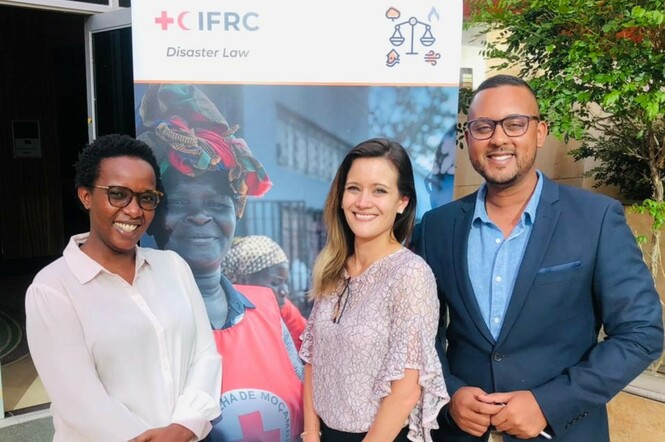
“Given the humanitarian crises facing Africa this year – the pandemic, climate-related disasters that are increasing in frequency and intensity and other emergencies, strong and relevant disaster laws are more important than ever.
"Through remote and in-country support our team has provided training, technical support for the development of law and policy, regional advocacy and new tools – all with the crucial aim of keeping communities safe and saving lives.”
Building the capacity of African National Societies in disaster law through training, workshops and events have been a focus of 2021, including the:
- Disaster Law and Legislative Advocacy webinar series
- International Disaster Response Law in the southwest Indian Ocean workshop held in partnership with the Indian Ocean Regional Intervention Platform (PIROI)
- Sessions of the African Climate Fellowship, to share with Anglophone and Francophone fellows the importance of law and policy in climate-smart disaster risk management
- Disaster Law and Legislative Advocacy workshop in Botswana, as part of an ongoing project in support of the development of the DRM Bill and the review of the Botswana Red Cross Act
- Legislative advocacy training for Somalia Red Crescent Society.
Through this training, the Africa Disaster Law team reached more than 25 National Societies, and well over 200 people, including National Society and IFRC staff, government officials, and other stakeholders were introduced to key tools developed by IFRC Disaster Law.
Support for the development of national law and policy in partnership with National Red Cross and Red Crescent Societies had success in Botswana, Malawi, South Sudan and Uganda. In Botswana, we are supporting the Botswana Red Cross in its role in the review of the Botswana Red Cross Society Act, as well as in the development of the DRM Law and Policy. In Malawi, we continue to support the Malawi Red Cross in its role in the development of the Disaster Risk Management Bill. In South Sudan, we are supporting the development of a Disaster Risk Management Bill. In Uganda, the Ugandan Parliament passed the Uganda Red Cross Society Bill, on the 11th of March 2021, to legally formalise the auxiliary role of Uganda Red Cross with the Government of Uganda and other public authorities. Additionally, we continue to support Uganda Red Cross in their engagement with the Office of the Prime Minister in the development of the DRM Bill.
Regional partnerships and engagement saw our team feature at the Eighth Africa Regional Platform for Disaster Risk Reduction. With UNDRR, we hosted a Parallel Working Session on Comprehensive Disaster and Climate Risk Management in Africa to foster exchanges between disaster risk reduction and climate change adaptation stakeholders with a view to identifying challenges and opportunities for enhancing coherence between climate change adaptation and disaster risk reduction policies, strategies, and practices. As part of the panel, Uganda Red Cross highlighted the key role of the National Society in the development of coherent DRR and CCA policies and strategies, aimed at enhancing sustainable development.
IFRC Disaster Law Africa also had the privilege of representing IFRC in the drafting committee of the Nairobi Declaration on accelerating the path to achieving the goals and targets of the Programme of Action for the Implementation of the Sendai Framework for Disaster Risk Reduction 2015-2030 in Africa. The Declaration captured key provisions that align to the strategy of engagement of the African National Societies and IFRC including the urging of States to ‘establish strong risk governance systems supported by regulatory and legal frameworks to buttress the implementation of the Sendai Framework and the Africa Programme of Action at all levels’.
The Disaster Law Africa team has also developed new Africa-specific disaster law tools. With the Africa Centre for Disease Control and Prevention, we held an online consultation for the Pilot Guidance for Law and Public Health Emergency (PHE) Preparedness and Response, to ensure the guidance is relevant to the region and, once finalised, will serve its purpose effectively. We also updated the Guide to the Auxiliary Role of Red Cross and Red Crescent Societies: Africa, a key tool in supporting National Societies, as well as public authorities and stakeholders, to better understand the foundational aspects of the auxiliary status. A new tool, entitled Advocating to strengthen Disaster Laws and Policies to Protect Internally Displaced Persons in Africa: A Guide for National Societies was developed for National Societies advocating for access to internally displaced persons in the event of a disaster, as well as for stronger disaster risk management and related laws and policies that not only ensure legal preparedness for disasters but also address disaster and climate-related internal displacement.
Lastly, we continue to map the legal arrangements of the auxiliary role and international disaster assistance in countries in Africa. Our new report, International Disaster Response Laws, Rules and Principles (IDRL) in Southern Africa aims to assess the legal preparedness of states in the sub-region to facilitate international assistance in the event that a disaster exceeds national capacities, and propose recommendations to strengthen IDRL. Following the publication of the report, our focus has shifted to mapping disaster risk management legal frameworks in West Africa and the Indian Ocean Islands. We are also developing an online platform to host the legal arrangements for international disaster assistance in each country.
We are grateful for the opportunity to work with, and for our National Societies and partners, without whose invaluable support these achievements would not be possible. We look forward to building on these achievements in the year ahead.